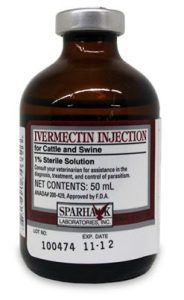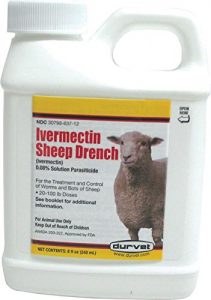Originally published in a magazine July 14, 2015

Heartworms are a serious threat to dogs. The heartworm larvae are carried and transmitted by mosquitoes: mosquitoes are everywhere, even in our home at times. Keeping your dog from being bitten by a mosquito is almost impossible, therefore heartworm prevention is important to keep the heartworm larvae from developing in your dog’s blood stream.
Heartworm prevention medications can be pricey since they need to be given every month, year round. One very popular brand is Heartguard: a chewable treat for your dog. It is reliable and well liked by veterinarians and dogs alike. Pet Armor is the same formula but is less expensive. If that is still too much for your budget, there is another option.
 The active ingredient in both brands is Ivermectin. Liquid Ivermectin is available without prescription for use on livestock at most Co-op stores and places like Tractor Supply Co. While it is not generally recommended to use a livestock medication on dogs – because the formulation for large animals can be different enough to cause harm to your dog – this drug is the same for both applications. The only difference is the dosage.
The active ingredient in both brands is Ivermectin. Liquid Ivermectin is available without prescription for use on livestock at most Co-op stores and places like Tractor Supply Co. While it is not generally recommended to use a livestock medication on dogs – because the formulation for large animals can be different enough to cause harm to your dog – this drug is the same for both applications. The only difference is the dosage.
Just be sure you get the injection (1%) solution (although we will NOT be injecting it), not the pour-on (5%) solution. Dilute this 1 part Ivermectin to 9 parts food grade glycerin, or buy the .08% Sheep Drench version and use that straight.
A Word of Warning
Ivermectin belongs to a class of drugs called macrocyclic lactones, which work by paralyzing the nervous system of susceptible organisms. The drug does not typically affect mammals because the blood-brain barrier prevents the drug from reaching the central nervous system. However some dog breeds possess a genetic mutation, called the MDR–1 gene deletion, which permits Ivermectin to cross the dog’s blood-brain barrier. The genetic trait has been documented in 10 breeds: white German shepherds, Australian shepherds, miniature Australian shepherds, English shepherds, longhaired whippets, McNabs, old English sheepdogs, Shetland sheepdogs, silken windhounds and collies. Not all members of these breeds possess the mutation, so it is wise to have your veterinarian test your dog for the mutation before using Ivermectin. In these breeds and any dog who has suffered a head injury, if Ivermectin is safe to use at all, the dosage must be extremely accurate. Overdosing even a little can cause serious harm.
Signs of Ivermectin toxicity include vomiting, drooling, staggering gait, weakness, dilated pupils, seizures, the inability to stand, blindness and coma. If you observe any of these symptoms, contact your veterinarian immediately. Unfortunately, Ivermectin poisoning is irreversible, so there is little your vet can do to help your pet, besides treat the symptoms and wait for the drug to leave the dog’s system.
Cutting the Cost of Heartworm Prevention
 An 8 ounce bottle of liquid Ivermectin (sheep drench) or a 50 ml bottle of Ivermectin 1% currently costs around $35.00 at a farm supply store, Wal-Mart or Amazon.com. One bottle can provide heartworm prevention to your entire herd of dogs for a year (depending on the number and size of dogs). A bottle of food grade glycerine costs around $12 and will last longer. Dilute the injection 1% Ivermectin 1 part Ivermectin to 9 parts glycerine.
An 8 ounce bottle of liquid Ivermectin (sheep drench) or a 50 ml bottle of Ivermectin 1% currently costs around $35.00 at a farm supply store, Wal-Mart or Amazon.com. One bottle can provide heartworm prevention to your entire herd of dogs for a year (depending on the number and size of dogs). A bottle of food grade glycerine costs around $12 and will last longer. Dilute the injection 1% Ivermectin 1 part Ivermectin to 9 parts glycerine.
If you use the sheep drench, use that as it is, no need to dilute.
Dosage
Use a hypodermic syringe (without needle) to draw out 0.1cc (1/10cc) per ten pounds of your dog (a 50 pound dog needs .5 (½) cc of Ivermectin solution) and squirt it onto an absorbent treat or food that they like and let them eat it. I use bread crusts: 1/4 crust for large dogs, 1/8 crust for the smaller ones, holds the medication well. You can squirt it directly into the mouth, but make sure they ingest the whole dose. Do this once a month and your dog is protected against heartworms.
Your syringe may be labeled in ml, not cc. 1 ml is the same as 1 cc.
Treating Heartworm Infestation with Ivermectin
Some rescues have had good results in treating heartworm positive dogs — especially older dogs who might not stand up under aggressive treatment with Immiticide — using heartworm treatment such as Ivermectin in a slow-kill technique.
This works best on dogs whose test registered a low score. This could be dangerous in heavily infested dogs because the worms continue to damage the heart and lungs until they die off naturally. Ivermectin has little effect on adult worms, it works mostly on the microfilaria or larval stage.
Start the dog on the appropriate dose of Cephalexin (antibiotic) 30 days before HW treatment. Give one regular-sized dose of Ivermectin and begin a 30 day course of Prednisone. 14 days later, give another regular sized dose of Ivermectin. From this point, give regular monthly doses of Ivermectin.
The Cephalexin not only fights infection in the dog, but works on the young-adult worm nervous system to make them more susceptible to the Ivermectin. The two doses in a month kills many of the immature adult worms as well as microfilaria (larval stage). The regular doses thereafter keep the microfilaria from developing into new adult worms. From this point on you’re waiting for the remaining adult worms to die off of natural causes, while preventing new ones from forming. The dog will test positive as long as any adult worms are present. This could be as long as 2 years.
We have successfully cleared dogs who tested a light positive in as little as 4 months. Once they test negative they can be adopted out.
Not only is this easier on an old or sickly dog than Immiticide, but considerably cheaper. But don’t try this on your own, it needs to be supervised by a veterinarian.
Other Uses
Alabama Angels Dog Rescue says if your dog develops mange, use a regular dose for the dog’s weight every 2 days for about 2 weeks and it kills the mange mites. Because of that blood-brain barrier thing, I’d check with a veterinarian before administering such high doses. There are other, less risky means of dealing with mange.
Disclaimer:
I am not a veterinarian, nor a doctor. I don’t even play one on TV. But in our animal rescue efforts I do work closely with veterinarians and am intimately involved in the medical treatment of foster dogs placed in our care. We try to keep up with developments in this area, and pass information like this along to you. I have verified these facts and consider them reliable.
Resources:
- http://www.dogaware.com/health/ivomec.html
- http://www.aquilakennels.com/ivermectin_print.html
- https://www.petmd.com/blogs/fullyvetted/2013/jan/toxic-ivermectin-and-safe-use-of-ivermectin-29671
- https://www.thespruce.com/ivermectin-for-heartworms-dogs-and-cats-3384697




Hi, I wanted to know your thoughts on Cydectin either 1% injectable or 0.1% oral sheep drench. Given orally at the suggested amount of 24mcg/kg. (Same as simparica trio) for heartworm prevention in dogs. because I live in Georgia I feel that Moxidectin would work better then ivermectin. They are currently on Advantage multi. I have eight dogs so it can get expensive. Thank you so much!
I am not familiar with either of those products. Sorry.
I researched the use of Ivermectin 1% solution 15yrs ago, as I owned 4 dogs. I have kept my dogs heartworm free for all these years. I also used the higher dosage formula for successful treatment of mange. Now 5 years later the same dog has mange again. Wish I had written down the dosage I had used, cause it was the only remedy that really worked!